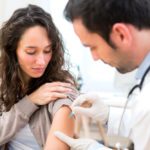Air temperature, humidity and sun exposure – as a person affected by a skin disease, you know that climate and weather can have both positive and negative effects on your skin. This is also the case for people affected by psoriasis. Every year they feel on their own skin how climate and weather can influence psoriasis.
As a chronic inflammatory skin disease, psoriasis usually occurs in waves. Acute phases with strongly occurring symptoms alternate with almost symptom-free periods. The climate is a so-called possible trigger (triggering factor) for those affected.
We have looked at how climatic conditions and weather influence psoriasis and can give numerous tips for all kinds of weather!
Psoriasis – causes and possible triggers
Psoriasis is a very individual disease that differs from patient to patient in terms of causes, symptoms and possible therapeutic measures.
Psoriasis occurs in different forms. Basically, excessive growth of skin cells takes place in affected persons, which is triggered by a misdirected reaction of the body’s own immune system.
Causes of psoriasis
The causes of this chronic inflammatory skin disease have not yet been fully clarified. However, physicians and scientists agree that a genetic predisposition in combination with certain triggering factors can promote the onset of the disease.
According to scientists, there is no specific psoriasis gene that causes the skin disease. Instead, the tendency to psoriasis is passed on via multiple genes. However, from a scientific and medical point of view, this predisposition alone is not sufficient to cause the disease to break out.
Triggers (triggering factors) of psoriasis
There are a number of triggering factors that favor the onset and worsening of the skin disease psoriasis.
These so-called triggers include in particular
- Infections (such as tonsillitis, angina, scarlet fever),
- Being overweight,
- Medications (such as antimalarials, beta-blockers, acetylsalicylic acid, lithium salts),
- Skin injuries (such as sunburn, cuts, tattoos),
- Mental stress and strain,
- Hormonal fluctuations (such as in puberty, pregnancy, menopause),
- Excessive consumption of alcohol and nicotine and/or
- Environmental influences.
All these factors can be, but are not necessarily, the trigger for the onset or worsening of psoriasis symptoms. Every patient has their own psoriasis – this applies to the possible causes, symptoms and also to the relevant treatment measures.
How climate and weather influence psoriasis
Not only those affected by psoriasis but also people with healthy skin feel the effects of environmental factors such as climate and weather. Stressful or strongly changing climatic conditions cause our skin problems.
The experience reports of people affected by psoriasis show that both the warm and cold seasons have their dark sides.
Psoriasis in the cold season
The cold season and especially the winter are a particular stress test for our skin. The skin often has to adapt to the changing conditions of frosty outside temperatures and the dry, warm air indoors several times a day.
At very low temperatures, the sebum production of our skin steadily decreases. Even healthy skin begins to dry out, tighten and itch. In addition to itching, those affected by psoriasis often struggle with severe redness and cracks in the skin.
Indoors, the temperatures are pleasant, but in winter our skin is additionally irritated by the heated, dry air and dries out.
In addition, the probability of catching an infectious disease or the like is always higher in winter. This susceptibility to infection and the associated illnesses in turn weaken your immune system, thus increasing the risk of your psoriasis worsening or a new attack altogether.
Psoriasis tips for the cold season
- Avoid hot water – shower in warm (not hot!) water for a maximum of ten minutes a day.
- Use a humidifier to counteract the heated, dry air in winter.
- Make sure you wear warm but air-permeable clothing to avoid excessive sweating.
- Moisturize your skin to protect it from drying out and itching, so pay close attention to your daily skincare routine.
- Infectious diseases are a well-known trigger for new attacks of psoriasis. Strengthen your immune system as a precautionary measure, for example by eating a balanced diet rich in vitamins or by resting sufficiently with relaxation techniques.
Psoriasis in the warm season
Many patients find that sunlight has a positive effect on the course of their psoriasis. We do not want to deny that: Sunshine is good for you and makes you happy.
Our body releases hormones such as the happiness hormone, endorphin, onto our skin when exposed to the sun. The sun also boosts the body’s own production of vitamin D, which benefits our immune system.
At the same time, however, you should not forget that hot and humid weather and too much sunlight can also have the opposite effect. For example, the risk of sunburn, excessive sweating, and severe moisture loss increases when the outside temperature is hot and we aren’t drinking enough water.
All this can promote a new onslaught of psoriasis or greatly worsen the current skin condition.
Psoriasis tips for the warm season
- Protect your skin from irritation and burns with sunscreen.
- Light, light-colored clothing made of natural materials helps you to avoid excessive sweating.
- Take in enough liquids to keep your skin well hydrated from the inside.
- Avoid the aggressive rays of the sun and maximum temperatures at midday – choose the morning or afternoon (or even evening) for your outdoor activities.
- Both the chlorinated water in swimming pools and the saltwater in the sea will irritate and dry out your skin, so don’t forget to shower after bathing.
Climatotherapy for psoriasis
What is the best medicine for your health? Every physician will probably agree with us when we say: exercise in nature, fresh air and a deliberately dosed portion of sunlight!
In climatotherapy, exactly these factors are used in combination with specific climatic stimuli to activate healing processes in the body and strengthen the immune system.
Climatotherapy is carried out by doctors in specialized therapy centers. The protective and stimulating factors of such a form of therapy include air quality, wind, temperature and UV rays.
Nowadays, physicians use this form of therapy to treat diseases of the respiratory tract and skin such as neurodermatitis, asthma and psoriasis (psoriasis vulgaris and psoriatic arthritis).
In the case of psoriasis, dermatologists particularly recommend regions with a lot of sunshine as well as salty and mineral-rich waters for climate therapy. For example, well-suited regions are:
- The Dead Sea,
- The North Sea and Baltic Sea or
- High mountains.
The influence of weather in psoriasis arthritis
The weather often has a negative influence on rheumatic complaints – such as psoriatic arthritis. Patients often experience a worsening of their illness, especially in damp and cold weather.
Psoriatic arthritis (PsA for short) is a rheumatic form of psoriasis. This chronic inflammation of the joints usually affects the hands, feet and spine. However, those affected by psoriatic arthritis often also suffer from complaints of the eyes, kidneys, intestines and cardiovascular system.
Many patients affected by rheumatic diseases such as psoriasis arthritis seem to feel changes in the weather in their bones and joints days in advance. This so-called weather sensitivity can be attributed to a disorder in the autonomic nervous system. Disorders of this kind intensify the existing inflammatory processes and thus lead to a higher incidence of pain.
Feel good in wind and weather
Psoriasis or not – many people feel the influence of the weather on our largest organ. The skin reacts at both low and high temperatures. However, each person perceives the reactions of their skin differently.
According to medical experts, climate and weather are not the cause of psoriasis, but they can very well be a trigger (triggering factor) that needs to be considered. In particular, patients affected by psoriatic arthritis feel climatic changes based on the symptoms of their disease.
But with our tips for both the cold & warm seasons, you too will be able to cope with the influence of the weather – caring for your skin is extremly important! Make sure you have adequate sun protection and provide your skin with sufficient moisture both from the inside and out.
Do you notice a difference in your skin? In which season does your skin cause you the most problems? Tell us – we would be happy to share more with you in our Facebook group!
FAQ about weather psoriasis
Can the weather cause psoriasis?
To date, the causes of psoriasis (psoriasis vulgaris) have not been fully and completely clarified. Scientists and doctors assume that psoriasis can break out and get worse through a combination of genetic predisposition and triggering factors. The weather can – but needs not – worsen the skin condition of a patient with psoriasis. Whether and to what extent there is an effect on the symptoms differs from patient to patient. Other triggers can be, for example, various medications, being overweight and fluctuations in stress levels or hormonal.
What is climatotherapy?
Climatotherapy uses natural climatic protection and stimulation factors to heal and regenerate both body and mind. In the context of spa and rehabilitation measures, climatotherapy is considered a scientifically recognized natural healing method. Especially in the short term, climatotherapy shows very good, soothing effects in the treatment of respiratory and skin diseases. A form of therapy using climatic stimuli is used, for example, for neurodermatitis, allergies, chronic bronchitis and psoriasis. The therapy can be carried out in coastal and sea climates (Thalassotherapy) or medium and high mountain climates.
What is Psoriasis-Arthritis?
Psoriatic arthritis is probably the most common form of additional diseases in psoriasis. It is a chronic inflammatory disease of the joints involving the skin. In most cases, psoriatic arthritis affects the hands, feet and spine. The treatment and therapy of psoriatic arthritis are carried out using non-steroidal anti-inflammatory drugs (NSAIDs), methotrexate (MTX), Ciclosporion or biologicals. Individually, tailored skincare, sufficient exercise and a balanced diet also play an important role.
Hier klicken, dann findest du alle Quellenangaben
Sources:
Ben-Amitai D., David M. (2009): „Climatotherapy at the dead sea for pediatric-onset psoriasis vulgaris“, in: Pediatric dermatology. URL: https://www.ncbi.nlm.nih.gov/pubmed/19250425 (accessed on 29.12.2019)
Engst R., Vocks E. (2000): „Hochgebirgsklimatherapie bei Dermatosen und Allergien – Wirkmechanismen, Ergebnisse und Einflüsse auf immunologische Parameter“, in: Rehabilitation. URL: https://www.thieme-connect.de/products/ejournals/abstract/10.1055/s-2000-5897 (accessed on 29.12.2019)
Kazandjieva J., Grozdev I., Darlenski R., Tsankov N. (2008): „Climatotherapy of psoriasis“, in: Clinics in dermatology. URL: https://www.ncbi.nlm.nih.gov/pubmed/18755366 (accessed on 29.12.2019)
Möhrenschlager M., Ring J. (2017): „Therapie entzündeter Haut: Es muss nicht immer Kortison sein“, in: Praxis. URL: https://www.ncbi.nlm.nih.gov/pubmed/28169597 (accessed on 29.12.2019)
Schuh A., Nowak D. (2011): „Evidence-based acute and long-lasting effects of climatotherapy in moderate altitudes and on the seaside“, in: Deutsche Medizinische Wochenschrift. URL: https://www.ncbi.nlm.nih.gov/pubmed/21246469 (accessed on 29.12.2019)
Seikowski K. (1999): „Medizinisch-psychologische Aspekte der Verarbeitung und Bewältigung chronischer Erkrankungen der Haut“, in: Haut und Psyche. Psychosoziale Medizin und Gesundheitswissenschaften. VS Verlag für Sozialwissenschaften, Wiesbaden. URL: https://link.springer.com/chapter/10.1007/978-3-663-07687-2_4 (accessed on 29.12.2019)
Simon D., Borelli S. (2001): „Wissenschaftliche Untersuchungen zur Wirkung der Hochgebirgsklimatherapie“, in: Physikalische Medizin, Georg Thieme Verlag KG. URL: https://www.thieme-connect.com/products/ejournals/html/10.1055/s-2001-14440 (accessed on 29.12.2019)

Bernd is one of the founders of Simply Psoriasis. He has been suffering from psoriasis for more than 20 years, but sees the chronic skin disease with more composure than a few years ago (which was a hard work). Nevertheless, he is very keen to make psoriasis easier and more socially accepted.









Last Comments